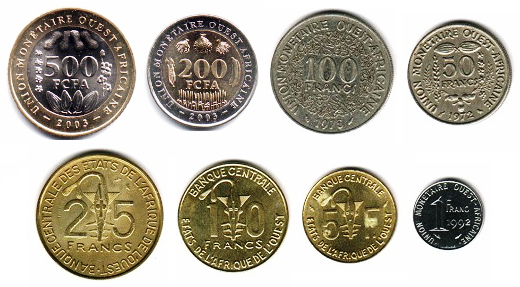So, up until now most of my posts have just been news about what I'm doing. I'm going to try starting something new, however, and making occasional posts that are just my experiences with day-to-day life in Senegal - things like public transportation, food, and culture shocks. Some of this is for my parents and brother, who will be joining me here for a few weeks' vacation during Will's winter break in December, and some of this is just to share all the little curiosities I come across here.
One of the things that has been very interesting for me to figure out during these last few months in Senegal has been the different currency. Along with several other former French colonies, Senegal uses the West African CFA (CFA stands for "Communauté Financière d'Afrique" or Financial Community of Africa). The exchange rate is about 500 CFA (more commonly known as "francs") to the dollar, though it fluctuates regularly to be about 50 CFA above or below that.
 |
| Image from https://en.wikipedia.org/wiki/West_African_CFA_franc#/media/File:BCEAOFranc.png |
 |
| Image from: http://africanbanknotes.blogspot.sn/2013/12/west-african-cfa-francs-banknotes-set.html |
Technically, there are eight coins and five bills, though only the five largest coins are in wide use - I've only run across a few 5 and 10 CFA coins, and never seen a 1 CFA. There is no sales tax, so prices are always exact, usually in increments of 50 CFA.
Prices are seldom marked on items here, and this combined with the ingrained culture of haggling means that the Senegalese are very good at remembering what they pay for things. I still get some funny looks for asking what things cost in stores, because they're used to people my age just knowing how much things are. I've started to memorize a fair amount of prices myself - 1.5L water bottles, for instance, are 400 CFA, whereas the same sized bottle of soda is 700 CFA. Here is a sample of what you can buy with each amount of money in Senegal:
1 CFA - Like I said, I am still not sure if these coins are worth the metal they're made of. I haven't run across anything so far that only costs so little.
5 CFA - one of the sticks people use to clean their teeth. Yes, you read that right, you can buy whittled, cleaned sticks from food stands and shops to keep in your pocket or the side of your mouth and scrub your teeth with throughout the day. Toothpicks and toothbrushes are also used, of course, but the traditional method of chewing and scraping with sticks after meals persists, even in the cities. I haven't tried it yet, but apparently it's a rather effective supplement to regular brushing.
10 CFA - a piece of hard candy from a corner shop. The corner shops themselves are a whole other fascinating post, but no matter how small the shop they always keep a few jars of different candies on the counter for children (and exchange students with a sweet tooth) to buy with their allowance. I'm rather fond of gingembre, a very strong hard ginger candy.
25 CFA - still haven't found anything that costs exactly 25 CFA, but useful as halves of a fifty.
50 CFA - A little bag of beignets (a kind of doughnut hole) or a small cup of Cafe Touba from one of the street snack carts, a short ride on a car rapide (price varies by distance traveled, but 50 is the base price), or a sandwich-sized, vacuum-sealed plastic bag of purified water (an alternative to water bottles; you bite a hole in a corner and drink from that).
100 CFA - A small orange, a small baguette, a regular cup of instant coffee, a single-serving packet of cookies, about a cup of freshly-cooked peanuts, a short ride on one of the nicer city buses, a banana, or a 10-pack of tissues.
200 CFA - a ride on a "moto," the taxi's two-wheeled cousin in Thiès. Young men drive them around the city and shout "moto" at pedestrians who look in need of transportation. Motos are two-seater mopeds or motorcycles (though I've seen ones with three or four children on the backseat instead), which provide a cheaper alternative to taxis, for the single passenger without a lot of baggage.
500 CFA - a taxi ride in Thiès, a very basic lunch of ceebu-jën from a food stand, a family-sized package of cooked peanuts, or a breakfast sandwich with meat, potatoes, and vegetables.
1000 CFA - lunch from a slightly more upscale food stand (that serves sandwiches or Senegalese food that is not ceebu-jën), a cross-city taxi ride in Dakar, a toothbrush, or a 10L bottle of purified water.
2000 CFA - a taxi ride if you're really bad at haggling or it's raining (price goes up because demand goes up), or a SIM card for a cellphone.
5000 CFA - a portable 3G internet connection, 2GB worth of data for your phone or 3G internet, or two meters of good cloth, which is about enough for making a dress.
10000 CFA - usual cost for having an outfit made by a tailor, though often negotiable if you are able to buy the cloth from the same shop.
As you can see, a few dollars can go a very long way here. The more upscale or western-style restaurants that I've been to in Dakar are only expensive in that they charge more what I'm used to paying for a lunch in the US. I haven't done any independent travel yet, but apparently the same is true for hotels as well - even the fanciest hotels listed in the guide don't generally go above 60000 CFA a night. Cost of living is balanced out by the high-cost of utilities, which are all privatized, but for travel it's very easy to do on a student's budget.









































